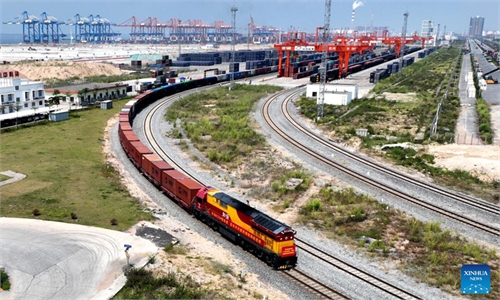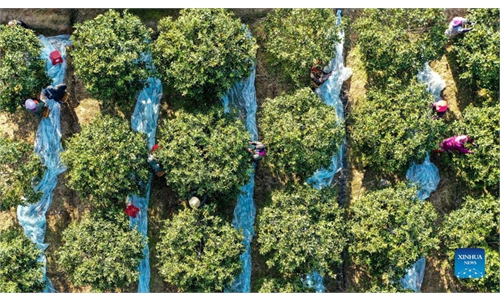Guangxi's Hengzhou grows into world jasmine center amid rural revitalization, providing 60% of global supply
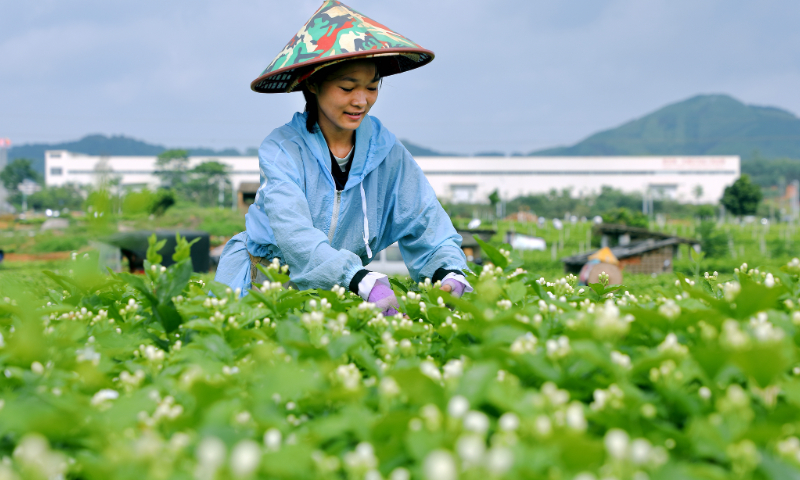
A farmer picks jasmine in Hengzhou, South China's Guangxi Zhuang Autonomous Region Photo: Courtesy of Hengzhou publicity authority
Hengzhou, South China's Guangxi Zhuang Autonomous Region, a renowned production base for jasmine flowers, has turned the small flower into a prosperous industry, supplying about 60 percent of the world's jasmine flowers and jasmine tea.
As a city benefitting from the country's rural revitalization strategy, the city has made a significant investment to build a jasmine industrial cluster that incorporates a variety of sectors including jasmine flower tea, potted plants and tourism, setting an example for the stronger development of specialty industries in the country's vast rural areas.
In 2022, the city's jasmine planting area reached 128,000 mu (8,533.33 hectares) and a total of 340,000 farmers were engaged in jasmine planting, the Hengzhou publicity authority told the Global Times.
The annual output volume of fresh jasmine flowers reached 100,000 tons with an equivalent value equaling 2.8 billion yuan, up 14.28 percent in output value year-on-year last year. Hengzhou has over 130 flower tea enterprises, of which 29 are large-scale enterprises above a designated size.
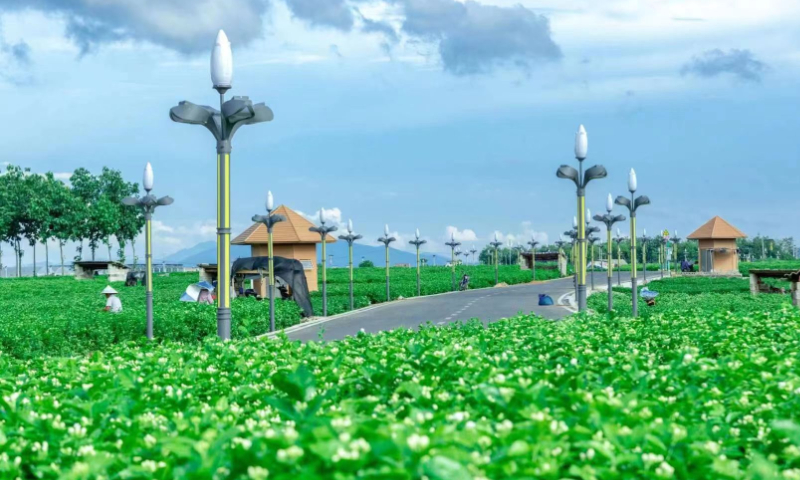
The renowned jasmine production base in Hengzhou, South China's Guangxi Zhuang Autonomous Region Photo: Courtesy of Hengzhou publicity authority
With recognition of the industry, the city has held the China National Jasmine Tea Trade Fair and China (Hengzhou) Jasmine Festival for 12 consecutive years and the World Jasmine Conference for four consecutive years. The first such conference was held in 2019 attracted more than 950 attendees from 20 countries and regions including France, Netherland, Japan and ASEAN members, according to the government department.
Jasmine originated in the ancient Roman Empire and then was transferred to China during the Han dynasty. Currently, Hengzhou's output volume for jasmine flowers and jasmine tea accounts for more than 80 percent of China's total output volume and 60 percent of the world's total, according to media reports.
Guangxi Lixiang Tea Group Co has planted over 1,000 mu of jasmine in 2022 and exported jasmine products to various overseas markets. A representative surnamed Nong from the group told the Global Times on Monday that most of the jasmine flowers planted in Hengzhou are environmentally harmless, while local enterprises are making the most efforts to reduce pesticide residue so as to expand exports to developed countries like Europe and North America.
"Sound weather, soil and wet conditions make the city appropriate for the planting of jasmine. We have also made great efforts in the research, talent training and publicity of Hengzhou jasmine. More important of all, farmers in Hengzhou are especially hard working," Huang Fajiu, a jasmine agronomist with Hengzhou Jasmine Industry Service Center, told the Global Times on Monday.
Thanks to the advantages, the output and quality of jasmine produced in Hengzhou outperform that in traditional planting areas including South China's Guangdong, East China's Fujian and Zhejiang provinces, at lower costs, according to Huang.
The jasmine yield is about 800-1000 kilograms per mu in Hengzhou, compared with 300-400 kilograms output per mu in Fuzhou, East China's Fujian Province. Meanwhile, the florescence of jasmine planted in Hengzhou in six months, compared with around four months in Fuzhou, he said.
Nong said the large-scale output in Hengzhou also attributes to special operation model comprising companies, agricultural bases and farmers. "The mechanism can efficiently address issues of land, technologies and the organization of farmers," he said, noting that the mechanism had been conducted for years and was quite effective with great achievements made by local jasmines industry.
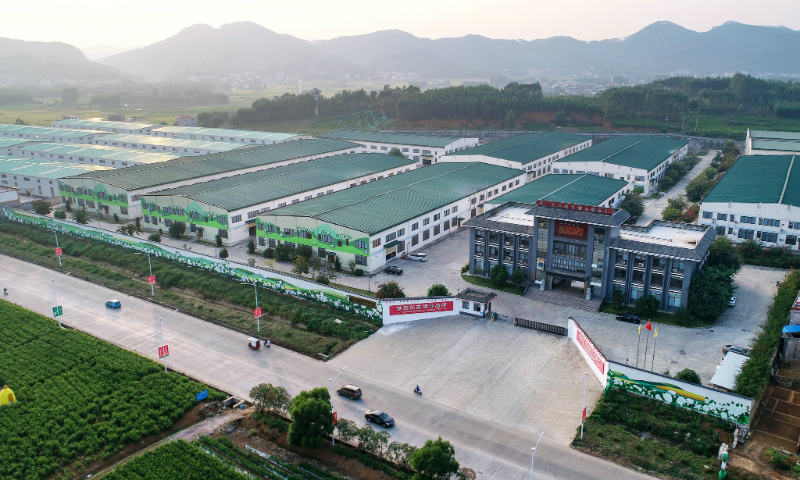
The renowned jasmine production base in Hengzhou, South China's Guangxi Zhuang Autonomous Region Photo: Courtesy of Hengzhou publicity authority
Policy support
After years' development, Hengzhou has become a typical example of the country's rural revitalization. The city has attached great importance to the development of jasmine industry, and rolled out a series of policies since 2016 to support the processing, technological improvement, branding of jasmine by integrating capitals, land and talent.
The annual central rural work conference held in December in Beijing pointed out that the development of industries is the most important on the agenda of rural revitalization, stressing particular attention paid to local specialties.
By relying on special agricultural and rural resources, benefits should be sought through developing a variety of agricultural functions, tapping multiple types of value in rural areas and integrated development of primary, secondary, and tertiary industries, according to the meeting.
Huang said the central government's policy support further boosted confidence in improving the economic benefits of jasmine, with the development of ornamental potted jasmine expected to be of great potential.
In 2023, the city will continue to spend efforts to promote stronger development of jasmine industrial cluster that incorporates jasmine flower tea, potted plants, food, tourism, catering, and sports and skincare products, among others, according to Hengzhou publicity authority.
With Hengzhou being the start point of the Pinglu Canal - one of the major projects of China's new western land-sea corridor - the project will bring convenience to the export of jasmine products, and Nanning will help promote the global influence of Hengzhou as global jasmine center by exporting jasmine products to ASEAN markets, Liu Xiaozong, deputy mayor of Nanning, capital of Guangxi, said during the 19th China-ASEAN Expo in September 2022.
